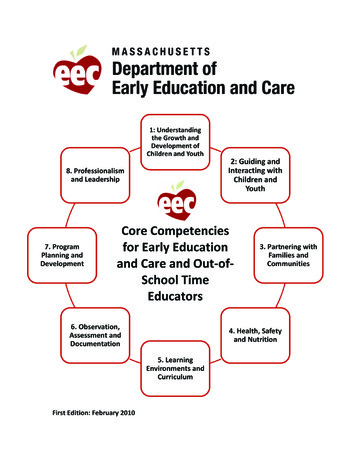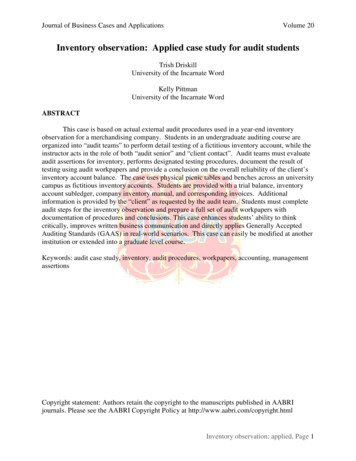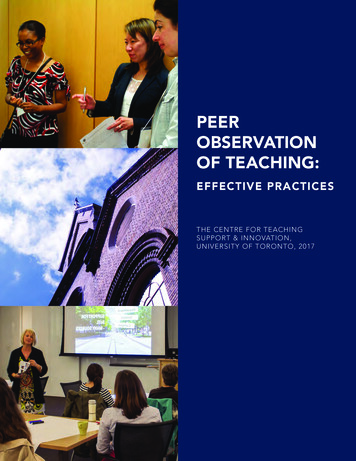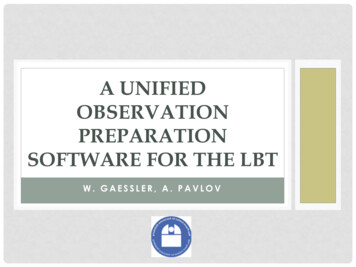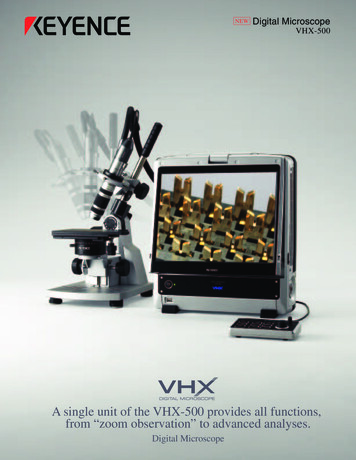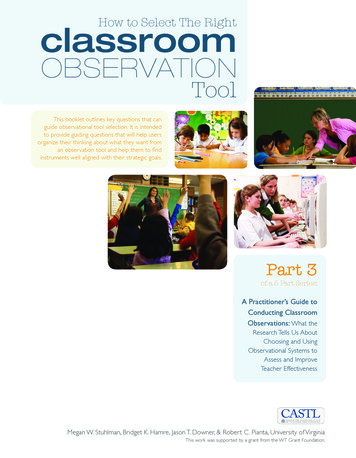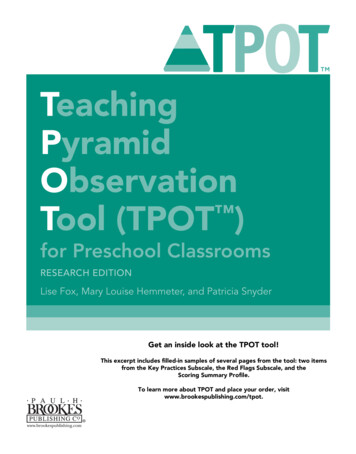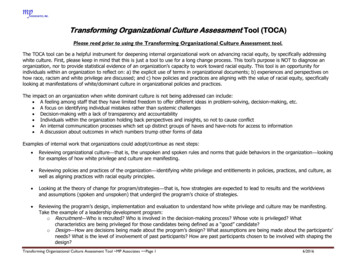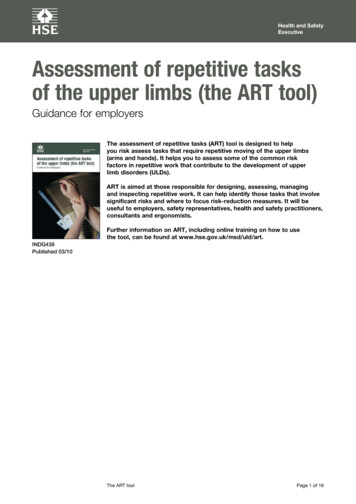
Transcription
OBSERVATION AS AN ASSESSMENT TOOL IN EARLY CHILDHOODEDUCATION: A PHENOMENOLOGICAL CASE STUDY OF TEACHER VIEWSAND PRACTICESA THESIS SUBMITTED TOTHE GRADUATE SCHOOL OF SOCIAL SCIENCESOFMIDDLE EAST TECHNICAL UNIVERSITYBYAYSUN TURUPCUIN PARTIAL FULFILLMENT OF THE REQUIREMENTSFORTHE DEGREE OF MASTER OF SCIENCEINTHE DEPARTMENT OF EARLY CHILDHOOD EDUCATIONJUNE, 2014
Approval of the Graduate School of Social SciencesProf.Dr. Meliha ALTUNIġIKDirectorI certify that this thesis satisfies all the requirements as a thesis for the degree ofMaster of Science.Prof.Dr. Ceren ÖZTEKĠNHead of DepartmentThis is to certify that we have read this thesis and that in our opinion it is fullyadequate, in scope and quality, as a thesis for the degree of Master of Science.Assoc.Prof.Dr. Feyza TANTEKĠN ERDENSupervisorExamining Committee MembersAssoc.Prof.Dr.Betil ERÖZ TUĞA(METU, FLE)Assoc.Prof.Dr. Feyza TANTEKĠN ERDEN (METU, ECE)Assist.Prof.Dr. Refika OLGAN(METU, ECE)
I hereby declare that all information in this document has been obtained andpresented in accordance with academic rules and ethical conduct. I also declarethat, as required by these rules and conduct, I have fully cited and referencedall material and results that are not original to this work.Name, Last Name: Aysun TURUPCUSignature:iii
ABSTRACTOBSERVATION AS AN ASSESSMENT TOOL IN EARLY CHILDHOODEDUCATION: A PHENOMENOLOGICAL CASE STUDY OF TEACHER VIEWSAND PRACTICESTURUPCU, AysunMS, Department of Early Childhood EducationSupervisor: Assoc. Prof. Dr. Feyza TANTEKĠN ERDENJune 2014, 125 pagesThe aim of this study is to determine the early childhood teachers‟ views aboutobservation as one of the informal assessment methods in young children‟seducation. The study was conducted with six early childhood teachers who worked ata private kindergarten in Ankara. In this study, phenomenological case study wasused. In order to examine the views of early childhood teachers on observation, mostappropriate data source in qualitative study, one-to-one interview was conductedwith participants. Additionally, three teachers among the participants were observedin their classrooms to determine how they applied observation in their classroom.According to the responses of early childhood teachers, assessment in earlychildhood education is a process-based issue and teachers mostly prefer observationbecause they believe that observation is the basis of the whole assessment progress.During observations, teachers pay attention to the children‟s needs and interests andtheir problematic behaviors. There is a consensus on teachers‟ views that the maincontribution of observation is to children. Futhermore observation data contributeteachers to do self-assessment. Finally, the main obstacles faced during observationiv
were defined as class-size and documentation in a systematic way. In order to dealwith these obstacles, teachers offered grouping of children in classroom duringobservation. Moreover, there might be more teacher- training provided by expertsabout assessment to enhance teachers‟ knowledge about young children‟sassessment.Keywords: Observation, informal assessment, views of early childhood teachers,observation challenges, phenomenological studyv
ÖZOKUL ÖNCESĠ EĞĠTĠMDE BĠR DEĞERLENDĠRME ARACI OLARAKGÖZLEM: ÖĞRETMENLERĠN GÖRÜġLERĠ VE UYGULAMALARI ÜZERĠNEBĠR FENOMENOLOJĠK DURUM ÇALIġMASITURUPCU, AysunYüksek Lisans, Okul Öncesi Eğitimi BölümüTez Yöneticisi: Doç. Dr. Feyza TANTEKĠN ERDENHaziran 2014, 125 sayfaBu çalıĢmada, okul öncesi öğretmenlerinin alternatif değerlendirme yöntemlerindenbiri olan gözlem ile ilgili görüĢlerini belirlemek amaçlanmıĢtır. Bu çalıĢmaAnkara‟da bulunan özel bir anaokulunda görev yapan altı okul öncesi öğretmeni ileyürütülmüĢtür. ÇalıĢmada nitel çalıĢma desenlerinden, fenomenolojik durumçalıĢması tercih edilirken; okul öncesi öğretmenlerinin gözlem ile ilgili görüĢlerinibelirlemek için, veri aracı olarak bire bir görüĢme yöntemi kullanılmıĢtır. Ayrıcaöğretmenlerin sınıflarında gözlem tekniğini nasıl uyguladıklarını belirlemek için,katılımcılardan üç öğretmen, araĢtırmacı tarafından gözlemlenmiĢtir. Öğretmenlerleyapılan bire bir görüĢmeler çalıĢmanın asıl verisini oluĢturmaktadır. Okul öncesiöğretmenlerinin yanıtlarına göre, okul öncesi eğitimde süreç odaklı değerlendirmeuygulanmalıdır. Değerlendirmenin temelini gözlemin oluĢturduğunu düĢündükleriiçin, okul öncesi öğretmenleri genellikle gözlem tekniğini tercih ettiklerinibelirtmiĢlerdir. Öğretmenler, sınıf gözlemlerinde çocukların ilgi ve isteklerinin yanısıra öğrencilerin sorunlu davranıĢlarına önem vermektedirler. ÇalıĢma sonucundaçıkan fikir birliğine göre, gözlemin en büyük katkısı çocuklara olurken, gözlemvi
verileri öğretmenlerin öz değerlendirme yapmalarına da yardımcı olmaktadır. Sonolarak, gözlem sırasında karĢılaĢılan asıl sıkıntılar, sınıf mevcudu ve sistematikdokümantasyon olarak belirtilmiĢtir. Bu sıkıntılarla baĢ etmek için öğretmenler,öğrenciler içerisinde gruplama uygulamasını önermiĢlerdir. Ayrıca okul öncesieğitim değerlendirmesi konusunda uzman kiĢiler tarafından verilecek olan öğretmenseminerlerinin de yardımcı olacağını düĢünmektedirler.Anahtar Kelimeler: Gözlem, alternatif değerlendirme, okul öncesi öğretmenleriningörüĢleri, gözlem sıkıntıları, fenomenolojik çalıĢmavii
To my parent and friends viii
ACKNOWLEDGEMENTSI express my gratitude to my supervisor Assoc. Prof. Dr. Feyza TANTEKĠNERDEN for her support, guidance and encouragement during her intense workpressure.I would like to thank the members of my thesis committee, Assoc. Prof. Dr.Betil ERÖZ TUĞA and Assist. Prof. Dr. Refika OLGAN for their helpful commentsand suggestions.I would like to thank the Scientific and Technological Research Council ofTurkey (TUBITAK) for their financial support through my graduate education.I wish to express my deepest gratitude to my parents; my father OsmanTURUPCU, my mother Fikriye TURUPCU, my sister Selcan TURUPCU OCAKand lastly our new family member Can Ali OCAK. Their encouragement and supporthelp me to finish this long thesis writing process.I have been blessed with amazing friends; they supported me with their belief,patience, encouragement and full energy. My special thanks go to Murat DOĞANfor his deepest moral encouragement during this long thesis writing process. I amgrateful to Gamze BĠLĠR SEYHAN with her endless patience to help and guide innumerous ways. I would like to thank my dear friends, Ġrem GÜRGAH OĞUL,AyĢın NOYAN ERBAġ, and Tuğçe KARADUMAN for their moral support,friendship, patience and understanding. I feel very lucky to have them of all goodand bad times. I am very thankful to all of them, individually.ix
TABLE OF CONTENTSPLAGIARISM . .iiiABSTRACT . . ivÖZ . .viDEDICATION .xiiiACKNOWLEDGEMENTS . ixTABLE OF CONTENTS . .xLIST OF TABLES . .xiiiLIST OF FIGURES . .xivLIST OF ABBREVIATIONS. .xvCHAPTER1.2.INTRODUCTION . 11.1.Purpose of the Study . 51.2.Significance of the Study. 61.3.Research Questions. 81.4.Definitions of Terms . 8REVIEW OF LITERATURE . 102.1.The Importance of Assessment in Early Childhood Education . 102.2.Informal Assessment in Early Childhood Education . 132.3.Observation in Early Childhood Education . 182.4. The Early Childhood Assessment in Turkey, Ministry of NationalEducation, the Early Childhood Education Program (2013) . 232.5.Current Studies on Teachers‟ Views on Assessment . 282.5.1. Studies on Teachers‟ Views on Assessment in Turkey . 332.6.3.Summary. 34METHODOLOGY . 363.1.Research Design . 363.2.Participants and Settings of the Study . 373.2.1. Participants . 373.2.2. Setting of the Study . 40x
3.3.Data Collection Tools and Procedure . 413.3.1. Interview . 413.3.2. Observation . 433.4.Data Analysis Procedure . 463.5.Quality of Research . 483.5.1. The Role of Researcher. 483.5.2. Nature of Data . 493.5.3. Trustworthiness . 503.6.4.Limitations. 51FINDINGS . 524.1. Views and Actions of Early Childhood Teachers on the Early ChildhoodEducation Assessment and the Role of Observation in this Assessment Process . 524.1.1. Views of Early Childhood Teachers on the Role of Observation in EarlyChildhood Education Assessment . 534.1.2. Actions of Early Childhood Teachers related with Observation in TheirClassroom . 584.2. Views of Early Childhood Teachers on the Benefits/ Contributions ofObservation (Data) to Children, Early Childhood Teacher and Early ChildhoodEducation Program . 644.2.1. Views of Early Childhood Teachers on the Benefits/ Contributions ofObservation (Data) to Children. 654.2.2. Views of Early Childhood Teachers on the Benefits/ Contributions ofObservation (Data) to Early Childhood Teacher . 664.2.3. Views of Early Childhood Teachers on the Benefits/ Contributions ofObservation (Data) to Early Childhood Education Program . 674.3. Views and Actions of Early Childhood Teachers on the Challengesconfronted during Observation and Ways to Deal with these Challenges . 694.3.1. Views of Early Childhood Teachers on the Challenges Confronted duringObservation . 694.3.2. Views of Early Childhood Teachers on the Ways to Deal with Challengesduring Observation . 714.3.3. Actions of Early Childhood Teachers about the Challenges and the Waysof Addressing Challenges . 735.DISCUSSION . 785.1.Discussion . 78xi
5.1.1. Role of Observation in Early Childhood Education Assessment . 785.1.2. Benefits of Observation for Children, Early Childhood Teacher and EarlyChildhood Education Program . 815.1.3. Challenges that Early Childhood Teachers Faced During Observation . 845.1.4. Addressing Challenges Teachers faced during Observation . 875.1.5. Views and Actions of Early Childhood Teachers about Observation . 895.2.Educational Implications . 905.3.Recommendations for Future Study . 92REFERENCES . 94APPENDICES . 103APPENDIX I- CONSENT FORM .103APPENDIX II- DEMOGRAPHIC INFORMATION SHEET .105APPENDIX III- INTERVIEW PROTOCOL .107APPENDIX IV- OBSERVATION SHEET .109APPENDIX V- TURKISH SUMMARY .111APPENDIX VI- TEZ FOTOKOPĠSĠ ĠZĠN FOTOKOPĠSĠ .125xii
LIST OF TABLESTABLESTable 3.1. Teaching Experience .38Table 3.2. Participants interviewed or observed . .38Table 3.3. Distribution of interview questions .43Table 3.4. Schedule of classroom observation .44Table 3.5. Research Questions and data sources .46Table 4.1. Role of observation in early childhood education assessment .53Table 4.2. Early childhood teachers prefer observation because it . 54Table 4.3. Issues those teachers taken into consideration during observation . .56Table 4.4.Views and actions of early childhood teachers about role ofobservation .59Table 4.5. Views of early childhood teachers on the benefits of observation .64Table 4.6. The early childhood teachers‟ views on the benefits/contributions ofobservation to children .65Table 4.7. Views of early childhood teachers on the benefits/ contributions ofobservation to teachers . .66Table 4.8. Views of early childhood teachers on the benefits/ contributions ofobservation to program .67Table 4.9. Challenges that early childhood teachers faced during observation 69Table 4.10. Addressing challenges that early childhood teachers faced duringobservation by 72Table 4.11. Views and actions of teachers about challenges .74Table 4.12. Views and actions of teachers how they deal with challenges .75xiii
LIST OF FIGURESFIGURESFigure 2.1. Assessment happens after an episode of learning and teaching .14Figure 2.2. Assessment is integral to the enhancement of learning .15Figure 2.3. The cyclical nature of observation (from observation to planning) .22xiv
LIST OF ABBREVIATIONSECEEarly Childhood EducationMoNEThe Ministery of National EducationNAEYCNational Association for the Education of Young ChildrenPCGCPsychological Counseling and Guidance CenterPParticipantxv
CHAPTER I1.INTRODUCTIONAssessment is a complicated subject in education. Stiggins & Chappuis,(2012) created a metaphor that states assessment as a global positioning system(GPS) to understand the importance and necessity of assessment in education.Assessment serves as an orienteering and tracking system for students‟ learningsuccess and their education. In a GPS, people enter their current location and adestination. Then, the information gets wired into it and satellites help people keeplocated; so the best route is determined by the system. Similarly, assessment forlearning is thought of as a GPS for student learning. While teachers are satellites, ineffect, they are loading the system with the students‟ current location. Moreover,Stiggins and Chappuis (2012) added that based on the objectives and indicators ofeducation, the best destination for students is determined, and through the wholeprocess, success is detected in students‟ education as final destination.In educational settings, the role of assessment has gained importance over theyears. Assessment is a crucial concern of educational studies since assessmentprocesses are considered to have an impact on children‟s learning. The role ofassessment in education and lack of information about this aspect of education fieldis emphasized in the study of Broadfoot (1998). According to this study, assessmentis the most critical issue, and is not like the other aspects of education. Although therole of assessment has begun to be stressed in studies, according to the Bowman,Donovan, and Burns (2000), “Assessment is in a state of flux There are anumber of promising new approaches to assessment, among them variations on theclinical interview and performance assessment, but the field must be described asemergent. Much more research and development are need ” (p12). Moreover,Meisels, and Atkins-Burnett (2000) stressed specifically the issue of assessment inearly childhood education as “Early childhood assessment is a field in transition.Dominated from its inception by psychometric models and measurement strategiesused with older children and adults, it is only now beginning to forge a methodology1
that is unique to very young children.” (p.231). Therefore, there is an increase in thesupport for further research in early childhood education assessment.While Dunphy (2010) emphasized that assessment has growing reputationamong educators in all levels of education systems; new analyses and studies aresupported, particularly in early childhood education (and care). Accoding to thestudies conducted by Bowman, Donovan, and Burns (2000), and Shepard, Kagan,and Wurtz (1998), teaching and assessment in early years is considered to have animportant place as in other levels of education systems.Although the role of assessment in education is stressed through the studies;in general, assessment as a term is currently considered as a product or a result indaily life. Assessment is generally defined as tests, results, conclusions, reports, etc.Besides social daily life, in education there are many assessment methods appliedthroughout different levels in schools. Most students take these applications in theform of achievement tests, IQ tests, tests for admission to a college or university, andtests determining students‟ grade for each reporting period through their education.Assessment, however, is more than the testing that is familiar to people. WhileGoodwin and Goodwin (1987) defined assessment as “The process of determining,through observation or testing, an individual‟s traits or behaviors, a programcharacteristics, or the properties of some other entity, and then assigning a number,rating or score to that determination” (p. 523), Farr (1991) said that it is not a sortingprocess, and it should basically be thought of as a guide instead of a type ofjudgment; so “assessment must serve students.” (p.95). As the number of studiesbased on this aspect of education has increased, there have been changes in the viewsof researchers about assessment and its definition. In their study, Chen andMcNamee (2007) defined assessment as the process of listening, observing, andgathering evidence for learning progress of children in a classroom environment.While the assessment aspect of education is stressed in all levels of students, Hortonand Bowman (2002) mentioned that the concern about the pre-primary assessment isan ongoing process. They believe that understanding the current state of the field iscrucial, and the way assessment practices are carried out will improve the learningand development of young children. Specifically, assessment of young children isdifferent from the assessment of older students. Wortham (2005) stated that not only2
children who do not write or read, but the young developing child presents differentchallenges that influence the choice of assessment strategy or assessment tools.There has to be a match between the chosen strategy for assessment and the level ofmental, social and physical development of children at each stage. Moreover, there isa rapid developmental change in young children, which requires assessing whetherthe development is progressing normally or not. In order to meet this need, differentassessment methods and strategies are used in early childhood education. There aredifferent and definite alternatives for assessment applications and methods ineducational settings for young learners.In literature, two main headings are defined for the assessment in earlychildhood education. The first one is the formal assessment in early childhoodeducation. This kind of assessment refers mostly to the standardized tests in which achild‟s performance in different developmental domains is translated into a score andthat score is compared with either the performance of other children or with specificcriteria or objectives. Instruments that are used in formal assessment are mostlyfocused on reliability and validity (Appl, 2000; Puckett & Black, 2000). Spinelli(2008) noted that formal assessment procedures generally rely on recognitionresponses, test items and mechanical scoring which were not suitable for youngchildren‟s assessment in terms of children‟s developmental characteristics.Moreover, there is another claim why formal assessment should not be preferred inyoung children‟s assessment procedure. Trying to standardize the learning process atan early age is inappropriate because it causes much academic pressure at youngerages (Hyson, 2003). Hanes (2009) stated clearly that “because young children are sodiverse in their abilities and needs, assessment at the preschool level is particularlychallenging” (p. 39). Also different studies support that it is inappropriate to employ“a scattering of tests as a measure of success” because of children‟s varied abilities.(Epstein, Schweinhart, DeBruin-Parecki, & Robin, 2004; Horton & Bowman, 2002;Wagner, 2003). Therefore, another type of assessment is suggested for youngchildren education rather than standardized assessment.Literature supports the benefits of informal assessment procedures not onlyfor young children but also upper grades (Fore, Burke, & Martin, 2006; Shinn,Collins, & Gallagher, 1998). Informal assessment mostly refers to instruments that3
are non-standardized. It does not give a translation from a child‟s performance to ascore and any comparison between a child‟s performance and other children orcriteria. This kind of assessment is based mostly on observation, interviews, andoften involves normal classroom experiences (Appl, 2000; Puckett & Black, 2000;Wortham, 2005). In early childhood education, young children benefit from thefeedback resulting from informal assessment. Considering their education process,they are encouraged to produce knowledge via experience rather than reproduceknowledge. Neisworth and Bagnato (2004) believed that ongoing classroomassessment is more suitable as an accurate and appropriate method of data collectionand evaluation. Assessment of young children is also a challenging issue, andchildren‟s competencies are situation-dependent; therefore, their responses to theconstraints of standardized testing are not good. Spinelli (2008) emphasized that“With the increasingly diverse population of learners in our schools today, it isimportant that educators employ alternates to traditional assessment models” (p. 5).Therefore, the preference of early childhood teachers and adults working in this fieldis to choose informal assessment rather than standardized testing in young childassessment procedures.In young children‟s assessment process, early childhood teachers applieddifferent informal assessment tools to support children‟s learning and development.Observation, checklists, anecdotal records, running records, portfolios, rubrics,teacher-designed strategies, and performance-based strategies are defined as informalassessment tools in early childhood education (Guddemi & Case, 2004; Wortham,2005). Although different strategies are applied to assess children‟s learning,observation has a role as the base of informal assessment because most of the criticalinformation about children‟s development can be gathered by observing children‟sbehaviors. According to Neisworth and Bagnato (2004), besides documentation,observation is determined as the heart of informal assessment. In young children‟seducation in the past, the analysis of the first sign of assessment was made based onobservation. At the beginning of the 20th century, for instance, observation was usedto assess human beings‟ behaviors. Dunphy (2010) emphasized the tradition of childobservation in early childhood education with these words “Many of the pioneers inthe field (e.g. Froebel, Piaget, Vygosky and Isaacs) strongly promoted the process of4
watching, listening and reflecting on children‟s action and words” (p.41). In order tomake learning visible, a student‟s/child‟s learning should be assessed with the help ofobservational evidence of the learning. Much critical information about children canbe gathered via close observation in classroom; therefore, in this study focuses on therole of observation specifically.Moreover, teachers are the best observers during the application ofobservation, one of the informal assessment methods in classroom. Dunphy (2010)expressed his views as “Educators who have close personal relationships withchildren are the people best placed to make observations of their learning” (p. 48).Teachers gather clues about children‟s learning and their education throughobservation. Therefore, teachers‟ views and applications related with observationhave come into prominence. Determination of teachers‟ views and practices aboutassessment of young children has important roles in both young children‟sdevelopment and early childhood program. Therefore, in this study, early childhoodteachers‟ views on one of the informal assessment methods, observation, areexamined. This study defines the views of early childhood teachers about benefitsof observation, the challenges confronted during observation and how teachersaddress the challenges. Moreover, the connection between views and actions of earlychildhood teachers about observation are determined through this study.1.1.Purpose of the StudyIn recent years, education of young children has gained importance andresearchers have carried out studies on development and learning of young children.Moreover, obviously, assessment of young children attracts more attention. Based onyoung children‟s developmental capabilities, in early childhood education, teachersmostly prefer informal assessment tools rather than standardized tests to completedevelopmentally appropriate education. One of the important informal assessmenttools applied in young children‟s education is declared as observation and Dunphy(2010) represented teachers as the best observers in education because of the closerelationship between children and teachers in classroom. During the day, teachershave chances to see the differences in children‟s behaviors in classroomenvironment. At that point, views of teachers are critical and gain more importancebecause they can catch children‟s rapid and ongoing development. This issue5
becomes the subject of different studies in which the relation and connectionbetween the views of teachers and education of children were emphasized fromdifferent perspectives (Brassard & Boehm, 2007; Flowers, Ahlgrim-Delzell, Browder& Spooner, 2005; Horton & Bowman, 2002; Schappe, 2005). Brassard and Boehm(2007) believed that teachers‟ beliefs and opinions have made a significantcontribution to children‟s development. The relation between teachers‟ views andstudents‟ development has been the subject of studies; however, in literature thestudies based on teachers‟ views concerning assessment of children are limited. Inone of the studies Hanes (2009) expressed that teachers‟ beliefs about assessmentmay contribute to children‟s development either positively or negatively. Whilestudies focusing on teachers‟ views about assessment have been conducted abroad,especially since 2005, some studies have been carried out on assessment in Turkey aswell. In these studies, the subjects were determined as higher grade students, insteadof young children. (Erdiller & McMullen, 2002; Gelbal & Kelecioğlu, 2007;Yıldırım & Semerci 2006). Nevertheless, the number of studies that targetedteachers‟ views on early childhood education has been limitedThe general aim of this study is to determine the views of early childhoodteachers about observation in Turkey. The views of teachers are critical becauseteachers have the main role during classroom observation. In detail, the study hastried to find out why teachers prefer observing, what they think about role ofobservation in young children‟s assessment, what kind of challenges are confrontedduring observation and how they deal with such challenges during observationthrough teachers‟ responses. Moreover, via observing teachers in their classroom,their actions about observing were analyzed and the connection between views andactions of early childhood teachers was emphasized. Determining teachers‟ viewsonce again
According to the responses of early childhood teachers, assessment in early childhood education is a process-based issue and teachers mostly prefer observation because they believe that observation is the basis of the whole assessment progress.
